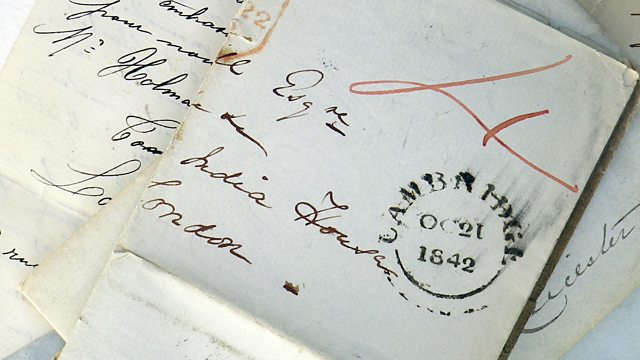
Yours sincerely
Poetry, prose and music on the theme of letters, with readings by Rosalie Craig and James D'Arcy. With texts by Austen and Hardy, plus music by Janacek, Britten and Leonard Cohen.
Yours sincerely: Rosalie Craig and James D'Arcy read extracts on the theme of letters.
Letters can be the most intimate form of expression, defiantly public, or a window onto somebody's life at a particular time. They can be funny or tragic, or in the case of some novels, a useful way for a character to convey, or miss, vital information. The programme includes a number of real letters from people such as Scott of the Antarctic, Elizabeth I and Siegfried Sassoon, plus fictional letters from works by Hardy, Austen and Shakespeare. There are letter scenes from operas by Mozart and Tchaikovsky, plus letter-related music by Janacek, Britten and Leonard Cohen.
Last on
Music Played
Timings (where shown) are from the start of the programme in hours and minutes
-
Ralph Waldo Emerson
Letters, read by James DArcy
![]() 00:00
00:00Wolfgang Amadeus Mozart
Che soave zefiretto from The Marriage of Figaro
Performer: Charlotte Margiono (Countess), Barbara Bonney (Susanna), Royal Concertgebouw Orchestra, Nikolaus Harnoncourt (conductor).- TELDEC 4509 90861-2.
- CD3 Tr4.
![]() 00:03
00:03Aaron Copland
Letter from �鶹Լ�� (excerpt)
Performer: Buffalo Philharmonic Orchestra, JoAnn Falletta (conductor).- NAXOS 8.559240.
- Tr6.
Sylvia Plath
Letters �鶹Լ��, read by Rosalie Craig
![]() 00:07
00:07Michael Torke
Overnight Mail; Standard
Performer: Apollo Saxophone Quartet, Orkest de Volharding.- ARGO 4556842.
- Tr2.
Letter from the Front
Letter from the Front, read by James DArcy
Thomas Bailey Aldrich
The Letter, read by Rosalie Craig
![]() 00:13
00:13Leos Janáček
String Quartet no.2 Intimate Letters; 2nd movement (excerpt)
Performer: Artemis Quartet.- VIRGIN CLASSICS 3533992.
- Tr6.
![]() 00:17
00:17Giuseppe Verdi
Grand March from Aida arr R Sanders (excerpt)
Performer: Philip Jones Brass Ensemble.- DECCA 4662412.
- CD1 Tr8.
Giuseppe Verdi
Letters of Giuseppe Verdi, Trans Charles Osborne, read by James DArcy
Thomas Hardy
Tess of the DUrbervilles, read by Rosalie Craig
![]() 00:22
00:22Pyotr Ilyich Tchaikovsky
Eugene Onegin: Letter scene (excerpt)
Performer: Galina Gorchakova (Tatjana), Kirov Orchestra, Valery Gergiev (conductor).- PHILIPS 4464052.
- Tr3.
William Shakespeare
Twelfth Night, read by James DArcy
![]() 00:29
00:29Sir Alexander Campbell Mackenzie
Twelfth Night: Act II sc 5 By my life, this is my ladys hand!
Performer: �鶹Լ�� Scottish Symphony Orchestra, Martyn Brabbins (conductor).- HYPERION CDA66764.
- Tr2.
Amy Lowell
The Letter, read by Rosalie Craig
![]() 00:33
00:33Rebecca Clarke
Midsummer Moon
Performer: Lorraine McAslan (violin), Ian Jones (piano).- DUTTON CDLX 7105.
- Tr1.
![]() 00:39
00:39Ralph Vaughan Williams
Scott of the Antarctic: Death of Evans and Oates (excerpt)
Performer: �鶹Լ�� Philharmonic, Rumon Gamba (conductor).- CHANDOS CHAN10007.
- Tr17.
Robert Falcon Scott
Letter to his Wife, read by James DArcy
Jane Austen
Emma, read by Rosalie Craig
![]() 00:43
00:43Muzio Clementi
Sonatina in G major Op.362; Allegretto
Performer: Martin Souter (fortepiano).- ISIS CD024.
- Tr21.
Siegfried Sassoon
Public Statement of Defiance, The Times Newspaper, read by James DArcy
![]() 00:00
00:00Gerald Finzi
Only a man harrowing clods (Requiem da Camera)
Performer: Stephen Varcoe (baritone), Clifford Benson (piano).- HYPERION CDD22026.
- CD1, Tr1.
Edward Lear
Letter to Harry Hinde, read by Rosalie Craig
![]() 00:51
00:51Dobbin-Garrett-Garman-Brianbert
Please Mister Postman
Performer: The Beatles.- PARLOPHONE CDP7464362.
- Tr7.
Oscar Wilde
Letter to Lord Alfred Douglas, read by James DArcy
![]() 00:54
00:54Johannes Brahms
String Quartet in C minor, Op.511: Romance (excerpt)
Performer: Takács Quartet.- DECCA 4756525.
- CD1 Tr2.
Queen Elizabeth I
Letter to King Erik of Sweden, read by Rosalie Craig
![]() 00:59
00:59Benjamin Britten
Courtly Dances (from Gloriana)
Orchestra: �鶹Լ�� Philharmonic. Conductor: Edward Gardner.- CHANDOS CHAN10658.
- Tr3.
![]() 01:01
01:01Benjamin Britten
Night Mail
Performer: Nigel Hawthorne (narrator), The Nash Ensemble, Lionel Friend (conductor).- HYPERION CDA66845.
- Tr28.
Napoleon Bonaparte
Letter to Josephine, read by James DArcy
![]() 01:05
01:05Gabriel Fauré
Chanson damour, Op.271
Performer: Ailish Tynan (soprano), Iain Burnside (piano).- OPUS ARTEOACD9018D.
- Tr16.
Dana Gioia
The Letter, read by Rosalie Craig
![]() 01:08
01:08Leonard Cohen
The Letters
- COLUMBIA 5147682.
- Tr3.
Producer’s Note - Yours sincerely
Letters can be the most intimate form of expression, defiantly public, or a window onto somebody’s life at a particular time. They can be funny or tragic, or in the case of some novels, a useful way for a character to convey, or miss, vital information. The programme includes a number of real letters. Some to loved ones: Captain Scott bidding farewell to his wife as he realises he’s not going to survive his expedition to the South Pole, Oscar Wilde’s letter to Bosie on the night before his trial, and Napoleon to his fickle Josephine. There is also a young Sylvia Plath writing joyfully to her mother back in America on meeting fellow poet Ted Hughes for the first time. Some of these most intimate letters have become important historical documents: Queen Elizabeth I’s rejection of a marriage proposal from King Erik of Sweden, explaining that she’s never felt that sort of love towards anybody, and a letter from the front describing the famous truce during the Christmas of 1914. A very different and public appraisal of the war was written by Siegfried Sassoon as an open letter to The Times in 1917, stating his belief that the war was being deliberately prolonged by those in power.����
Letters have been used as a plot device in literature for centuries. Shakespeare’s hapless Malvolio is taken in by a letter supposedly from his revered mistress, telling him to wear yellow stockings and a huge smile, much to the amusement of the real perpetrators. And many a heroine has been undone by a letter. Tess of the D’Urbervilles realises only on her wedding morning that the letter explaining her shameful past has not reached her future husband. Similarly, Pushkin’s Tatiana writes an ill-fated letter declaring her love to Eugene Onegin; I’ve used this extract in its powerful operatic treatment by Tchaikovsky.�� Literary letters are also used as an insight into the true characters of the sender, and sometimes the recipient too.�� Austen’s Emma is a good example of this, as she deigns to be impressed by a letter from a suitor to her friend and protégé Harriet. ��
The programme also includes poems, some in epistolary form such as Edward Lear’s tongue-twisting Letter to Harry Hinde. In his poem The Letter, Thomas Aldrich muses on the strange sensation of reading the living words from someone who has recently died. Some poems say that letters are the most eloquent way to express emotions, while others deplore plain words on paper as inadequate for the magnitude of feelings they strive to convey. The final poem is by Dana Gioia, and describes beautifully the feeling that maybe a letter which never arrived could have solved everything.
There were some musical letters which I had to include: Mozart’s sublime duet as the Countess dictates to her maid Susanna in The Marriage of Figaro, and the famous Letter Scene in Tchaikovsky’s Eugene Onegin. Janacek subtitled his 2nd String Quartet ‘Intimate Letters’, and there are less well-known letter related pieces by Copland and Michael Torke. Finally, I couldn’t resist Auden and Britten’s collaboration for the GPO film unit – Night Mail.
Ellie Mant, producer
��
Broadcast
- Sun 6 Mar 2016 17:30�鶹Լ�� Radio 3
The hidden history of plant-based diets
Books website
Get closer to books with in-depth articles, quizzes and our picks from radio & TV.



